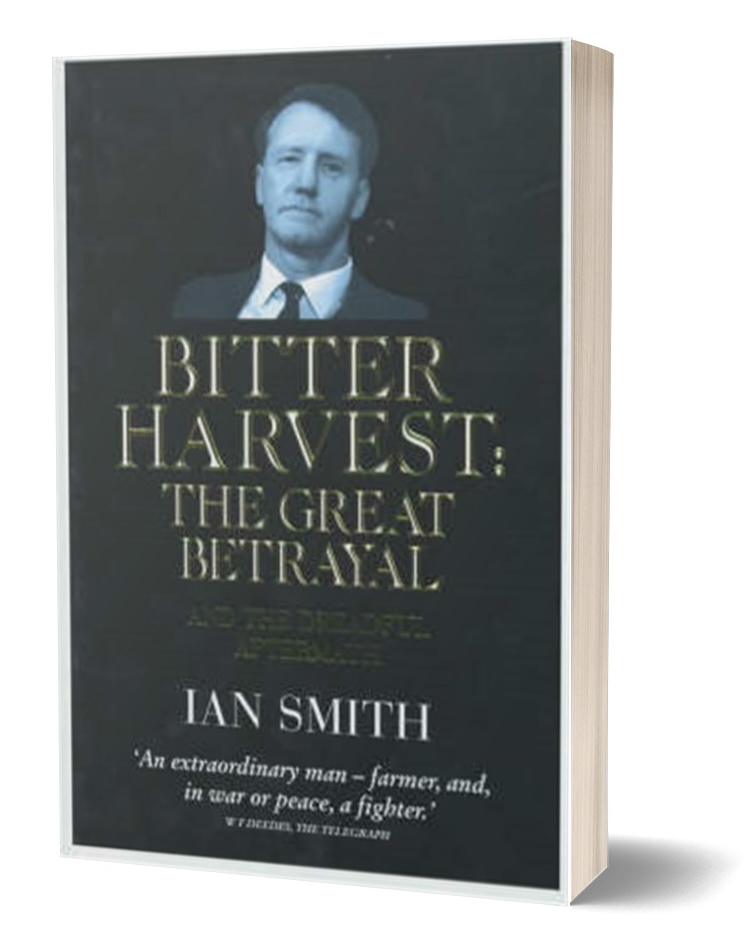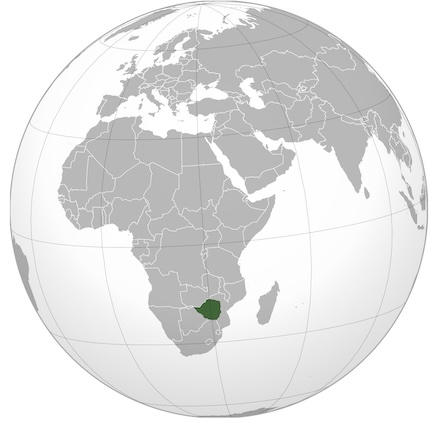Bitter Harvest: The Great Betrayal and the Dreadful Aftermath by Ian Smith
Book summary
Keywords:
Informed
Golden Age
Nation Building
Apr 2, 2025
This book is the autobiography of Ian Smith, the last Prime Minister of Rhodesia.

ISBN: 978-1903402054
Published: February 1, 2001
Pages: 432
Available on:
amazon
This book is the
autobiography of Ian Smith, the last Prime Minister of Rhodesia.
Rhodesia became present day Zimbabwe in 1979. It is now under black majority rule.
"
For a decade and half, Smith held British and international diplomacy to ransom. Vilified by many, lionised by a few, he became a household name around the world. Then Rhodesia vanished."
"
A country that set out life as a jewel of post-colonial Africa has become a basket case, a nightmarish kleptocracy sustained by violence, corruption and reverse racism, its every failing blamed by President Robert Mugabe on a plot orchestrated by the country’s remaining whites and by the old colonial power in London to overthrow his rule."
"
History rewrites reputations, and the plight of Zimbabwe after 28 years of Mugabe’s rule is forcing a second look at the reputation of Ian Smith."
Why Rhodesia matters today?
"
Rhodesia was not a typical African colony, ruled directly from Whitehall. It was founded by Rhodes under a charter extended to his company. From the start it was a sub-contracted or, to use the modern term, outsourced form of empire."
"
Blacks, he [Ian Smith] maintained, were happy in their separate universe. When pressed, he might talk of a gradualism, of ‘evolution not revolution’ as if to suggest that one day blacks might take charge, by a route that avoided the ‘disasters’ that had occurred in many newly independent for colonies to the north. "
"
In his Rhodesia, self righteous paternalism was the order of the day. Whites would refer without a trace of self consciousness to ‘our black people’. Smith would contrast the turbulence of post independence Nigeria, patch of southern Africa, home of ‘the happiest black faces you ever saw’. the Congo and Uganda with his own placid, contented and white-ruled."
Character of Rhodesia

Rhodesia, now Zimbabwe.
"
So our foundations were built by people with strong, individual character, with that important quality of having the courage of their convictions — British people who were playing their part in building the British Empire. "
"
this was no place for faint-hearted men, those who were not dedicated, or were not inspired by the cause they were serving."
"
Law and order in your society, discipline at your school, play the game by your fellow man, you cannot let your team down, and in the final analysis it may even be necessary to die for your cause. Those were the conditions under which you lived, under which, as a member of the British Empire, you were privileged to live."
"
At the end of the First World War in 1918, Rhodesia was prospering and developing in all spheres of life and the settlers were beginning to talk about managing their own affairs, governing themselves. The performance of Rhodesians all round had been exemplary. The economy was well managed, development was planned and there was steady progress. There was a history of harmonious race relations and, in the recent war, Rhodesians had made a contribution second to none."
"
Given that I was brought up under a system where sport was part of one’s training, discipline, character formation, and the idea that one should partake of as many kinds as possible."
"It is worth repeating: great nations are built on the foundation of great families."
The world has a lot to learn from Rhodesia.
Racism in Rhodesia
"
Blacks, he maintained, were happy in their separate universe. When pressed, he might talk of a gradualism, of ‘evolution not revolution’ as if to suggest that one day blacks might take charge, by a route that avoided the ‘disasters’ that had occurred in many newly independent for colonies to the north.
But Smith let slip the truth to an interviewer: ‘I don’t believe in black majority rule ever, not in a thousand years.’"
"
In his Rhodesia, self righteous paternalism was the order of the day."
"
The British writer David Caute, in his 1983 history of the period, Under the Skin: The Death of White Rhodesia, described Smith’s attitude thus."
"His attitude towards Africans was empty of hatred. He bullied them, but politely. He hectored and lectured them, but not at the level of personal abuse. Because he could always ban them, detain them and lock them up – which he often did – he felt unthreatened by them at a personal level. They were opponents but within the wider contours of history and geography."
"
That judgement rings true. Smith’s real enemies were whites, above all the hypocritical ruling establishment of the mother country, emblem of all that had gone wrong with post-war Britain."
Fall of Rhodesia
Rhodesia became a victim of changing geopolitics in the world.
"
It was the Suez crisis of 1956 which first sounded the alarm, and brought those of us associated with Britain and the Empire face to face with the hard reality that Britain could no longer call the tune on the international stage. The United States was now in the driving seat, constantly propagating the philosophy that colonialism was inherently bad and that the pace of its elimination had to be stepped up."
"
‘You cannot divorce yourself from the world we live in.’ To which Smith responded, ‘Perhaps it’s the politicians we have to deal with, rather than the world we live in.’ To the last Smith believed he was the victim not of irresistible pressures, but of the spinelessness of his supposed friends."
Rhodesia and Ian Smith did not go down easily.
"
A major sin of course, was that he offended the establishment by not accepting the fate of Rhodesia as decreed by Whitehall. His rebellion against the Crown forfeited the support of many who otherwise would have been his allies within the British and other bodies politic. Nevertheless, he secured the admiration of many ordinary people, who admired his unwavering stand for his principles."
"
the socialists in Britain to be small-minded men, often upstarts with large chips on their shoulders and, into the bargain, as far as Rhodesia was concerned, they were still seeking revenge for our UDI. This was no surprise to Kissinger, who had already experienced their deviousness, and now had evidence that they were conniving with the black presidents behind his back. Sad to say, he believed he had had more honest dealings with the black presidents. This did not surprise me, because we knew only too well how many British politicians were happy to bend their principles in order to curry favour with the OAU [Organization of African Unity]. "
Role of Henry Kissinger and USA
"
On the Sunday morning, after the introductions, Kissinger suggested that he and I go into a small adjoining room. He told me that, as he saw it, he was being asked to participate in the demise of Rhodesia. If this were so, he said, then it was one of the great tragedies of his life, an experience he would have hoped to be spared, but fate had decreed otherwise."
Instead of helping preserve Rhodesia, UK and USA were doing all they can for its demise.
"Kissinger said that, regrettably, it had to be accepted that the Western world was soft and decadent, and it was difficult for him to claim that the USA was any different."
"
Once again, he [Henry Kissinger] stressed that his heart was heavy for us and our wonderful country, about which he had heard so much. If we rejected this offer, there would be understanding and sympathy, never recrimination from him.
Rhodesia was one of the great tragedies of the modern world, and the fact that he was a participant made him sad. The decision was for us to make."
* * *
"A statesman thinks of the next generation — a politician thinks of the next election."
Ian Smith and Rhodesia came from a different era which produced Statesmen like Henry Kissinger and Lee Kuan Yew. The present generation of politicians are socialsits and "
small-minded men, often upstarts with large chips on their shoulders"; and "
happy to bend their principles in order to curry favour."
Rhodesia's demise was because it didn't fit in with the new ideology of the new post WWII world. Results didn't matter. The fact that things are worse in Rhodesia (Zimbabwe) now for most of the population is an inconvenient fact to be ignored.
The Rhodesia story has also become a symbol of white supremacists.
Is our world today any better?
In our so called fake post-racist world today, no problems are solved. Poverty, racism, discrimination, inequality, and environmental destruction gets worse. The rhetoric gets louder. The viciousness more rabid.
Rhodesia reminds us of a time when a chartered, 'outsourced', 'private' State brought prosperity, good character, and good life to whites and black alike in a small corner of Africa. Then it was swallowed up by a changing world.
Related articles
From Third World to First: The Singapore Story: 1965-2000 by Lee Kuan Yew
Leadership: Six Studies in World Strategy by Henry Kissinger
External Links
